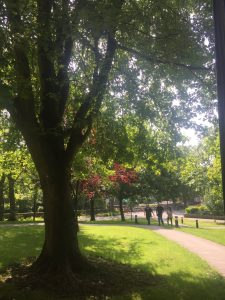This is my last blog of the academic year; after this week, the blog will take its summer break. It’s an opportunity to look back over the year just gone and to step back a little.
It’s been a busy and full year for the university with some striking achievements. The University has secured its global strategic partnership with La Trobe University, Melbourne, which is already paying dividends in collaborative work and new opportunities. We rose fifteen places in the Guardian university league table, meaning that we have now jumped thirty places in the last two years – with a real sense that momentum is with us on a long-term trajectory. We have secured the initial funding arrangements for the University estates plan, and in the next few weeks major work with begin on the city campus atrium and the Science Park. The University secured a £4m share of the £78m Extending Excellence in England research investment to support Lab4Living’s work on the ‘100 Year Life’. Construction is nearing completion on both the National Centre of Excellence in Food Engineering and the Advanced Well Being Research Centre, and we opened the National Centre for Excellence in Degree Apprenticeships. The University secured a significant contract with South Yorkshire Police to open up new training routes into the service. This year, the number of our students gaining international experiences as a part of their studies through our Go Global initiatives has doubled to over 1200. I could go on, and I’ve almost certainly missed out some important developments. All of our successes depend on collaborative, focused work across the university, and they all represent – as achievements in any organization do – achievements of individuals and groups working successfully together. No organisation is ever stronger than the people in it.
It’s now two years since we launched the University’s Transforming Lives strategy. A good number of the achievements above flow directly from the strategy. The strategy has involved, and continues to involve, challenging change across the university. The Professional Services Operating Model is in full implementation stage, overhauling the way we organise, manage and deliver professional services across the university. The implementation of the Hallam Help structure in January this year marked a significant shift to a smoother, more student focused delivery of academic and student support across the university. Work is now underway on the Academic Organisation Project looking, for the first time in fifteen years, at the way we structure and organise the academic work of the university. In the Autumn, we will begin a wide-ranging review of the university’s whole approach to sustainability and environmental responsibilities.
I know that major institutional change programmes like these can cause disruption and difficulty. But they are important, not for their own sake, but because the university needs to realise its ambitions against an external context which has become progressively more difficult over the last year.
This is the last blog before the summer break, but the challenges will remain – and the list can feel a long one: the threats of any sort of Brexit, but especially a ‘no-Deal’ departure poses to universities, the financial squeeze arising from fixed fees against rising costs, including the cost of pension contributions, the demands of an increasingly assertive Office for Students as it finds its feet as the universities’ regulator, the continuing decline in the number of eighteen year olds, and behind all these, the deeper challenges for universities of operating in an increasingly fractious and divided nation. And all this is apart from the obvious and increasingly alarming threats posed by rapid and unpredictable climate change!
In every walk of life, the working year has a rhythm. In educational institutions, those rhythms are provided by the academic year – although, in Saturday’s summer sunshine we ran our first open day for the 2020/21 academic year.
Though we are in increasingly uncertain times, it is important to take moment to reflect that this is the end of a highly successful year for the university. The summer is traditionally the time when the university is somewhat quieter, a time to draw breath and to recharge batteries. If you are having some time off this summer have a thoroughly enjoyable break.
